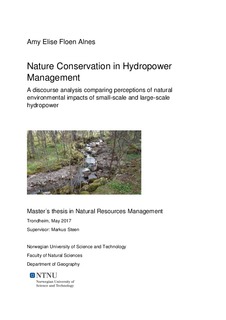Nature conservation in hydropower management : a discourse analysis comparing perceptions of natural environmental impacts of small-scale and large-scale hydropower
Master thesis
Permanent lenke
http://hdl.handle.net/11250/2449674Utgivelsesdato
2017Metadata
Vis full innførselSamlinger
- Institutt for geografi [1119]
Sammendrag
Hydropower has been an important aspect of the modernisation of Norway over the last 100 years, and it is still the most important source of renewable energy we have. With increasing focus on climate change and the negative consequences of fossil fuels, combined with an increasing demand of energy, hydropower is expected to continue to play an important role in the Norwegian energy market. But at the same time there is a conflict between different interests on whether continued development should be at the expense of Norwegian nature.
Traditionally, large-scale hydropower has been the backbone of Norwegian electricity supply, but large-scale hydropower is generally considered to have severe impacts on the natural environment in which the development takes place. In recent years there has been an increase in the development of small-scale hydropower, and although these installations do not contribute as much to renewable energy production, they are often perceived as having less severe negative impacts on the natural environment. However, these perceptions are not grounded in knowledge, and how they are expressed by actors in hydropower management can have implications for the future management of freshwater resources.
This thesis aims to identify if there are differences in the perceptions key actors in hydropower management have of the effects large-scale hydropower has on the natural environment compared perceptions of small-scale hydropower. This is done through a discourse analysis of the licencing documents of eight hydropower projects. The analysis is focused on statements made by five different actors in hydropower management, representing energy development interest, local and regional interests, and nature conservational interest. Special emphasis is given to how these actors treat the environmental parameters of landscapes and outdoor recreation, encroachment-free areas, and biological diversity, in the licencing process of six small-scale hydropower projects and two large-scale hydropower projects.
The results from the analysis show that the different actors represent different interests, and thereby value nature in different ways. Whilst impact on landscape and recreational values are emphasised for the large-scale projects, there is a general concern regarding the lack of knowledge about small-scale hydropower’s impacts on natural environmental values, especially related to biological diversity and endangered species.
